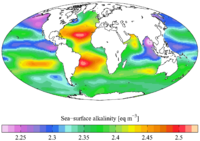state or quality of being alkaline (contrast with acidity; see pH).
Alkalinity (from Arabic "al-qalī") is the capacity of water to resist changes in pH that would make the water more acidic. (It should not be confused with basicity which is an absolute measurement on the pH scale.) Alkalinity is the strength of a buffer solution composed of weak acids and their conjugate bases. It is measured by titrating the solution with a monoprotic acid such as HCl until its pH changes abruptly, or it reaches a known endpoint where that happens. Alkalinity is expressed in units of meq/L (milliequivalents per liter), which corresponds to the amount of monoprotic acid added as a titrant in millimoles per liter.
Although alkalinity is primarily a term invented by oceanographers, it is also used by hydrologists to describe temporary hardness. Moreover, measuring alkalinity is important in determining a stream's ability to neutralize acidic pollution from rainfall or wastewater. It is one of the best measures of the sensitivity of the stream to acid inputs. There can be long-term changes in the alkalinity of streams and rivers in response to human disturbances.

